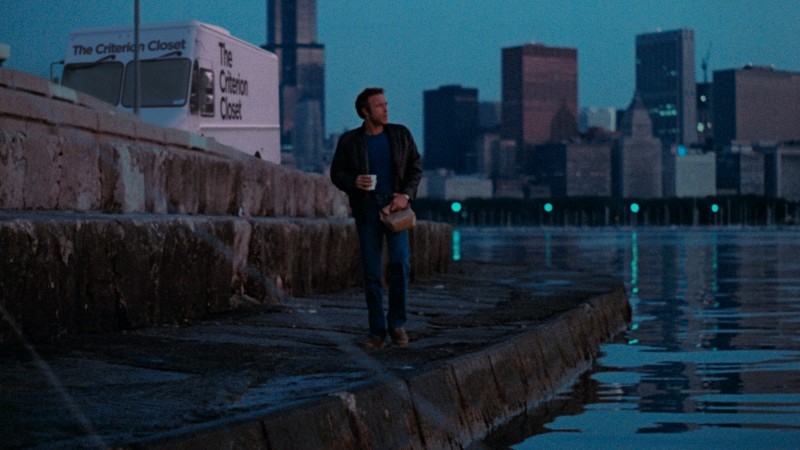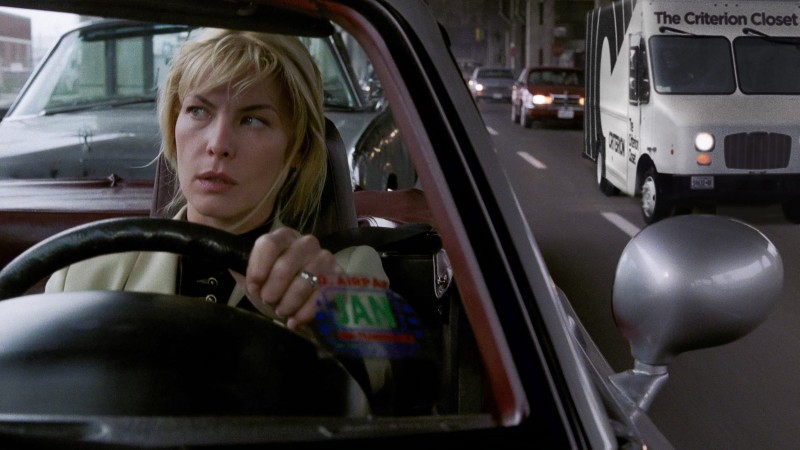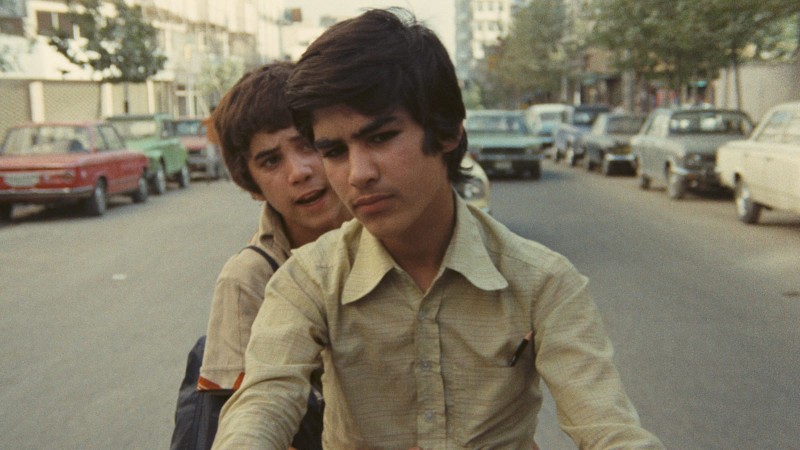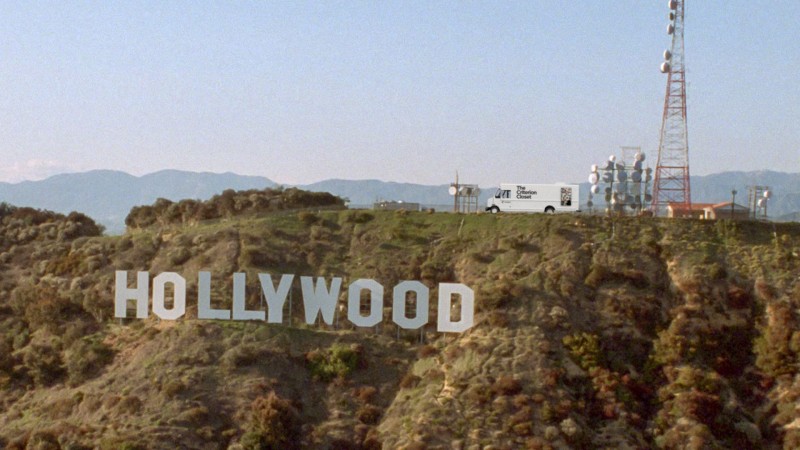Announcing 100 Years of Olympic Films

We are thrilled to announce the December 5 release of 100 Years of Olympic Films: 1912–2012, a landmark box set that documents the history of the Olympic Games through the lenses of an international array of filmmakers, including some of the world’s most acclaimed masters. Available in thirty-two-disc Blu-ray and forty-three-disc DVD editions, 100 Years of Olympic Films: 1912–2012 is now available for preorder at $319.96 from Criterion.com.
Spanning fifty-three movies and forty-one editions of the Olympic Games, 100 Years of Olympic Films: 1912–2012 is the culmination of a monumental, award-winning archival project encompassing dozens of new restorations by the International Olympic Committee. The documentaries collected here cast a cinematic eye on some of the most iconic moments in the history of modern sports, spotlighting athletes who embody the Olympic motto of “Faster, Higher, Stronger”: Jesse Owens shattering world records on the track in 1936 Berlin, Jean-Claude Killy dominating the Grenoble slopes in 1968, Joan Benoit breaking away to win the Games’ first women’s marathon in Los Angeles in 1984. In addition to the impressive ten-feature contribution of Bud Greenspan, this stirring collective chronicle of triumph and defeat includes such documentary landmarks as Leni Riefenstahl’s Olympia and Kon Ichikawa’s Tokyo Olympiad, along with captivating lesser-known works by major directors like Claude Lelouch, Carlos Saura, and Miloš Forman. It also offers a fascinating glimpse of the development of film itself, and of the technological progress that has brought viewers ever closer to the action. Traversing continents and decades, reflecting the social, cultural, and political changes that have shaped our recent history, this remarkable movie marathon showcases a hundred years of human endeavor.
Blu-ray and DVD Special Edition Collector’s Sets Feature
- 53 newly restored films from 41 editions of the Olympic Games, presented together for the first time
- Landmark 4K restorations of Olympia, Tokyo Olympiad, and Visions of Eight, among other titles
- New scores for the silent films, composed by Maud Nelissen, Donald Sosin, and Frido ter Beek
- A lavishly illustrated, 216-page hardcover book, featuring notes on the films by cinema historian Peter Cowie, along with a letter from Thomas Bach, President of the International Olympic Committee, a short history of the project by restoration producer Adrian Wood, and hundreds of photographs from a century of Olympic Games

The Restoration Project
The restorations presented in this collection are the culmination of a twenty-year project, launched in 1996 by the International Olympic Committee under President Juan Antonio Samaranch, to gather and preserve the cinematic heritage of the Olympic Games. The monumental effort, led by restoration producer Adrian Wood, involved the archives of over fifty broadcasters, studios, and libraries, working with over twenty film laboratories and digital restoration facilities, aided by a dozen local researchers and academics on five continents to recover and restore the fifty-three films collected in 100 Years of Olympic Films, along with the rest of the Olympic material that is today preserved within the IOC’s collection. Beginning with meticulous paper research, followed by a worldwide archival search for film elements, the restorers sought to recreate the original version of each film and present it in its original language. Whenever possible, the restorers worked from original camera negatives or first-generation intermediates, which were cleaned and physically repaired in the process. With only a couple of exceptions, all the films in this collection up to and including those of the 1992 Games have been scanned at either 2K or 4K resolution. Olympic Glory, the IMAX large-format film from Nagano 1998, was scanned at 8K resolution. Aiming to retain the character of the original film elements, restorers applied digital dirt- and scratch-removal tools by hand to remove damage, debris, and other defects from the image, improving stabilization and deflickering where appropriate. New 35 mm polyester-based picture and sound elements were created for long-term preservation. Films shot using video formats have been preserved from the best surviving source materials and digitally restored to address flaws in the original sources.
About the Scores
There are no surviving musical scores for the Olympic films from the silent period. For this collection, the Criterion Collection commissioned original accompaniments from noted silent film composers Maud Nelissen, Donald Sosin, and Frido ter Beek. Each composer had access to historical references that may have influenced his or her musical choices, but the resulting scores are not intended to be historically accurate musical reconstructions.

Moments of Olympic Glory
“The important thing in life is not the triumph but the fight; the essential thing is not to have won but to have fought well.”
—Pierre de Frédy, Baron de Coubertin, founder of the modern Olympic Games
Paris 1924: Sprinters Harold Abrahams (100 meters) and Eric Liddell (400 meters), later to be celebrated in the film Chariots of Fire, bring home gold medals for Great Britain.
Berlin 1936: American runner Jesse Owens sweeps the track-and-field events with four gold medals (100 meters, 400 meters, long jump, and 4 x 100–meter relay).
London 1948: Fanny Blankers-Koen, “the Flying Housewife” from the Netherlands, galvanizes the Games at the age of thirty with her gold medals in the 100 meters, 200 meters, 80-meter hurdles, and 4 x 100–meter relay.
Helsinki 1952: The Czechoslovak long-distance runner Emil Zátopek wins gold medals in the 5,000 and 10,000 meters before also winning the marathon, despite never having competed in one before.
Rome 1960: Ethiopian runner Abebe Bikila sets a world best with his barefoot victory in the marathon, becoming the first sub-Saharan African athlete to win an Olympic gold medal. Four years later, he will beat his own record, finishing first in the marathon at the Olympic Games Tokyo 1964—this time wearing shoes.
Grenoble 1968: Jean-Claude Killy (France), the aristocrat of Alpine skiing, dominates the X Olympic Winter Games, with a triple victory in slalom, giant slalom, and downhill skiing.
Mexico 1968: American Bob Beamon soars to a world record in the long jump with an 8.90-meter leap that still stands as the Olympic record today.
Innsbruck 1976: Franz Klammer (Austria) wins the Alpine skiing downhill gold medal, besting the winning time from twelve years earlier on the same course by more than thirty-two seconds.
Montreal 1976: Nadia Comăneci (Romania) scores the first perfect ten in the history of Olympic gymnastics—followed by six more.
Lake Placid 1980: The United States ice hockey team narrowly defeats the heavily favored Soviet Union team in a medal-round confrontation that pulses with suspense up to its final moments—a triumph that becomes known as the “miracle on ice.”
Los Angeles 1984: Joan Benoit (USA) overcomes injury to triumph in the inaugural women’s marathon. Sprinter Carl Lewis (USA) wins four gold medals, matching Jesse Owens’s legendary performance at the Olympic Games Berlin 1936. Mary Lou Retton becomes the first U.S. athlete to win a gold medal in the women’s individual all-around gymnastics event.
Barcelona 1992: In a transition from the Olympic tradition of amateur athletics, the USA assembles a “dream team” of NBA all-stars to take the court. Perhaps the greatest group of athletes ever assembled in a single team, they win the gold medal, beating their opponents by an average of forty-three points per game.
Beijing 2008: Jamaican runner Usain Bolt breaks world records in the 100 and 200 meters, celebrating with his trademark lightning-bolt pose as he becomes the first sprinter to set new records in both those events at the same Olympic Games.

Highlights from a Century of Olympic Films
“By some remarkable alchemy, the modern Olympic Games and the cinema were born at nearly the same moment . . . The Olympic documentaries gathered here represent not just a visual record of athletic accomplishment but a mirror for the evolution of cinema as an art form.”
—Peter Cowie, cinema historian
Newly restored and assembled by the International Olympic Committee, The Games of the V Olympiad Stockholm, 1912 (Stockholm 1912) is the earliest comprehensive moving-image record of the modern Olympic Games that survives today.
Leni Riefenstahl’s two-part athletic opus, the lyrical, grandiose Olympia (Berlin 1936), is perhaps the most influential sports film ever made. The controversial German filmmaker employed more than fifty cameramen and shot 1.2 million feet of film—roughly equivalent to the length of 120 features—blending footage of the events with stylized re-creations. Though financed by Germany’s Ministry of Propaganda, the film remains a landmark achievement to be reckoned with.
The vibrant White Vertigo (Cortina d’Ampezzo 1956) features cinematography by Aldo Scavarda, who would film L’avventura for Michelangelo Antonioni soon after. The music is by the prolific Angelo Francesco Lavagnino, who also scored Orson Welles’s Othello and Chimes at Midnight.
Hailed as a “masterpiece of visual design” by film scholar Donald Richie, Kon Ichikawa’s Tokyo Olympiad (Tokyo 1964) breathlessly combines massive spectacle with idiosyncratic portraiture. Captivated by the stories and personalities of individual athletes, the director of Fires on the Plain and The Burmese Harp harnessed widescreen photography to create one of the most visually imaginative sports films ever made.
Codirected by Claude Lelouch soon after his 1966 feature A Man and a Woman had won the Palme d’Or and two Academy Awards, the freewheeling 13 Days in France (Grenoble 1968)pulses with the insouciant spirit of the sixties and the carefree cinematography and editing pioneered by the French New Wave.
Masahiro Shinoda (Pale Flower), a key figure of the Japanese New Wave, brought his experience as a long-distance runner to the visually sumptuous Sapporo Winter Olympics (Sapporo 1972), bringing the Games to life in visceral detail.
For the Games of the XX Olympiad Munich 1972, producer David Wolper marshaled an all-star team of filmmakers to contribute segments to an omnibus film. Visions of Eight includes contributions by Olympic film veterans Claude Lelouch and Kon Ichikawa, as well as newcomers like Arthur Penn (Bonnie and Clyde), John Schlesinger (Midnight Cowboy), and Miloš Forman (One Flew over the Cuckoo’s Nest), whose witty decathlon segment is a notable highlight.
Carlos Saura’s Marathon (Barcelona 1992) makes for an illuminating companion to the director’s Flamenco Trilogy (Blood Wedding, Carmen, El amor brujo), eschewing commentary except for what can be heard through stadium speakers, and setting graceful athletic footage against a score by Alejandro Massó and musical contributions by Ryuichi Sakamoto and Angelo Badalamenti. Saura wanted his film’s length to match a plausible winning time for a marathon runner, so he delivered the 130-minute director’s cut included in this release.
The Everlasting Flame includes filmmaker Zhang Yimou’s monumental Opening Ceremony at the Olympic Games Beijing 2008, with behind-the-scenes footage of the director of Raise the Red Lantern and Hero discussing his vision for the spectacle.

The Films
Stockholm 1912
The Games of the V Olympiad Stockholm, 1912 (dir. Adrian Wood • 2016 • 170 minutes)
Chamonix 1924
The Olympic Games Held at Chamonix in 1924 (dir. Jean de Rovera • 1924 • 37 minutes)
Paris 1924
The Olympic Games as They Were Practiced in Ancient Greece (dir. Jean de Rovera • 1924 • 8 minutes)
The Olympic Games in Paris 1924 (dir. Jean de Rovera • 1924 • 174 minutes)
St. Moritz 1928
The White Stadium (dirs. Arnold Fanck, Othmar Gurtner • 1928 • 124 minutes)
Amsterdam 1928
The IX Olympiad in Amsterdam (dir. unknown • 1928 • 251 minutes)
The Olympic Games, Amsterdam 1928 (dir. Wilhelm Prager; supervisor Jules Perel • 1928 • 192 minutes)
Garmisch-Partenkirchen 1936
Youth of the World (dir. Carl Junghans • 1936 • 38 minutes)
Berlin 1936
Olympia Part One: Festival of the Nations (dir. Leni Riefenstahl • 1938 • 127 minutes)
Olympia Part Two: Festival of Beauty (dir. Leni Riefenstahl • 1938 • 103 minutes)
St. Moritz 1948
Fight Without Hate (dir. André Michel • 1948 • 91 minutes)
London 1948
XIVth Olympiad: The Glory of Sport (dir. Castleton Knight • 1948 • 138 minutes)
Oslo 1952
The VI Olympic Winter Games, Oslo 1952 (dir. Tancred Ibsen • 1952 • 103 minutes)
Helsinki 1952
Where the World Meets (dir. Hannu Leminen • 1952 • 101 minutes)
Gold and Glory (dir. Hannu Leminen • 1953 • 97 minutes)
Memories of the Olympic Summer of 1952 (dir. unknown • 1954 • 50 minutes)
Cortina d’Ampezzo 1956
White Vertigo (dir. Giorgio Ferroni • 1956 • 96 minutes)
Melbourne/Stockholm 1956
Olympic Games, 1956 (dir. Peter Whitchurch • 1956 • 60 minutes)
The Melbourne Rendez-vous (dir. René Lucot • 1957 • 106 minutes)
Alain Mimoun (dir. Louis Gueguen • 1959 • 24 minutes)
The Horse in Focus (dir. unknown • 1956 • 16 minutes)
Squaw Valley 1960
People, Hopes, Medals (dir. Heribert Meisel • 1960 • 93 minutes)
Rome 1960
The Grand Olympics (dir. Romolo Marcellini • 1961 • 147 minutes)
Innsbruck 1964
IX Olympic Winter Games, Innsbruck 1964 (dir. Theo Hörmann • 1964 • 90 minutes)
Tokyo 1964
Tokyo Olympiad (dir. Kon Ichikawa • 1965 • 170 minutes)
Sensation of the Century (prod. Taguchi Suketaro, supervisor Nobumasa Kawamoto • 1966 • 156 minutes)
Grenoble 1968
13 Days in France (dirs. Claude Lelouch, François Reichenbach • 1968 • 112 minutes)
Snows of Grenoble (dirs. Jacques Ertaud, Jean-Jacques Languepin • 1968 • 97 minutes)
Mexico City 1968
The Olympics in Mexico (dir. Alberto Isaac • 1969 • 160 minutes)
Sapporo 1972
Sapporo Winter Olympics (dir. Masahiro Shinoda • 1972 • 167 minutes)
Munich 1972
Visions of Eight (dirs. Miloš Forman, Kon Ichikawa, Claude Lelouch, Yuri Ozerov, Arthur Penn, Michael Pfleghar, John Schlesinger, Mai Zetterling • 1973 • 110 minutes)
Innsbruck 1976
White Rock (dir. Tony Maylam • 1977 • 77 minutes)
Montreal 1976
Games of the XXI Olympiad (dirs. Jean-Claude Labrecque, Jean Beaudin, Marcel Carrière, Georges Dufaux • 1977 • 118 minutes)
Lake Placid 1980
Olympic Spirit (dirs. Drummond Challis, Tony Maylam • 1980 • 27 minutes)
Moscow 1980
O Sport, You Are Peace! (dir. Yuri Ozerov • 1981 • 149 minutes)
Sarajevo 1984
A Turning Point (dir. Kim Takal • 1984 • 82 minutes)
Los Angeles 1984
16 Days of Glory (dir. Bud Greenspan • 1986 • 284 minutes)
Calgary 1988
Calgary ’88: 16 Days of Glory (dir. Bud Greenspan • 1989 • 202 minutes)
Seoul 1988
Seoul 1988 (dir. Lee Kwang-soo • 1989 • 139 minutes)
Hand in Hand (dir. Im Kwon-taek • 1989 • 119 minutes)
Beyond All Barriers (dir. Lee Ji-won • 1989 • 92 minutes)
Albertville 1992
One Light, One World (dirs. Joe Jay Jalbert, R. Douglas Copsey • 1992 • 104 minutes)
Barcelona 1992
Marathon (dir. Carlos Saura • 1993 • 130 minutes)
Lillehammer 1994
Lillehammer ’94: 16 Days of Glory (dir. Bud Greenspan • 1994 • 209 minutes)
Atlanta 1996
Atlanta’s Olympic Glory (dir. Bud Greenspan • 1997 • 206 minutes)
Nagano 1998
Nagano ’98 Olympics: Stories of Honor and Glory (dir. Bud Greenspan • 1998 • 119 minutes)
Olympic Glory (dir. Kieth Merrill • 1999 • 42 minutes)
Sydney 2000
Sydney 2000: Stories of Olympic Glory (dir. Bud Greenspan • 2001 • 117 minutes)
Salt Lake City 2002
Salt Lake City 2002: Bud Greenspan’s Stories of Olympic Glory (dir. Bud Greenspan • 2003 • 119 minutes)
Athens 2004
Bud Greenspan’s Athens 2004: Stories of Olympic Glory (dir. Bud Greenspan • 2005 • 96 minutes)
Turin 2006
Bud Greenspan’s Torino 2006: Stories of Olympic Glory (dir. Bud Greenspan • 2007 • 88 minutes)
Beijing 2008
The Everlasting Flame (dir. Gu Jun • 2010 • 101 minutes)
Vancouver 2010
Bud Greenspan Presents Vancouver 2010: Stories of Olympic Glory (prods. Bud Greenspan, Nancy Beffa • 2010 • 116 minutes)
London 2012
First (dir. Caroline Rowland • 2012 • 109 minutes)
Olympic films under exclusive license from the International Olympic Committee and the U.S. Olympic Committee. All rights reserved. Summary and design © 2017 The Criterion Collection. © International Olympic Committee. Oscar®, Academy Award®, and Academy Awards® are the registered trademarks and service marks of the Academy of Motion Picture Arts and Sciences.




